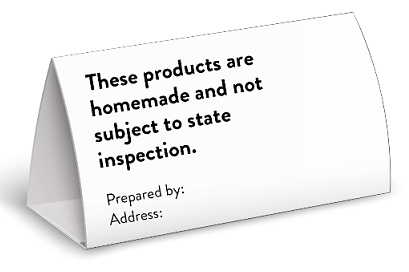Partnership and Workforce Development Unit
- PWDU Home
- Delegation Agreement
- Best Practices Manual
- Food Safety Partnership
- PWDU-FSP Updates
- FPLS Training for Environmental
Health Professionals - Outbreak Response Protocol
- Contact Us
Related Topics
Environmental Health Division
Chili or Soup Cook-Off Fundraisers
Beginning August 1, 2014, community-based nonprofit organizations, such as a service group or chamber of commerce, may hold chili or soup cook-offs without a food license if:
- City or town approves the fundraiser.
- Participants follow the food safety rules developed by the organizer.
- Chili or soup is properly labeled.
- If your chili or soup is homemade:

- If you make your chili or soup in a licensed kitchen:

- If your chili or soup is homemade:
Develop food safety rules
Food safety starts with you
- Learn food safety basics and train all workers.
- Don’t work if you have vomiting or diarrhea.
- Buy your ingredients--especially meats--from a safe source such as a grocery store or farmers’ market.
- Prepare chili or soup the day of the event to reduce risky practices such as cooling and reheating.
- Use a thermometer and when in doubt, throw it out!
Clean
- Wash hands and surfaces often.
- Follow safe handwashing steps.
- Wash, rinse, sanitize and air dry all utensils.
Separate
- Keep raw meat, poultry and their juices away from ready-to-eat foods.
- Use clean utensils with each new food.
- Wash hands after touching raw meat and poultry.
- Clean & Separate: Keeping Food Safe At Home
Cook
- Always cook foods to safe temperatures.
- Reheat foods quickly.
- Keep hot foods hot.
Chill
- Refrigerate foods right away.
- Cool foods quickly in small containers.
- Keep cold foods cold.
- Cook & Chill: Keeping Food Safe At Home
For more information
Minnesota Statutes, section 157.22 Exemptions
Effective August 1, 2014
(14) chili or soup served at a chili or soup cook-off fund-raiser conducted by a community-based nonprofit organization, provided:
(i) the municipality where the event is located approves the event;
(ii) the sponsoring organization must develop food safety rules and ensure that participants follow these rules; and
(iii) if the food is not prepared in a kitchen that is licensed or inspected, a visible sign or placard must be posted that states: “These products are homemade and not subject to state inspection.”
Foods exempt under this clause must be labeled to accurately reflect the name and address of the person preparing the foods.